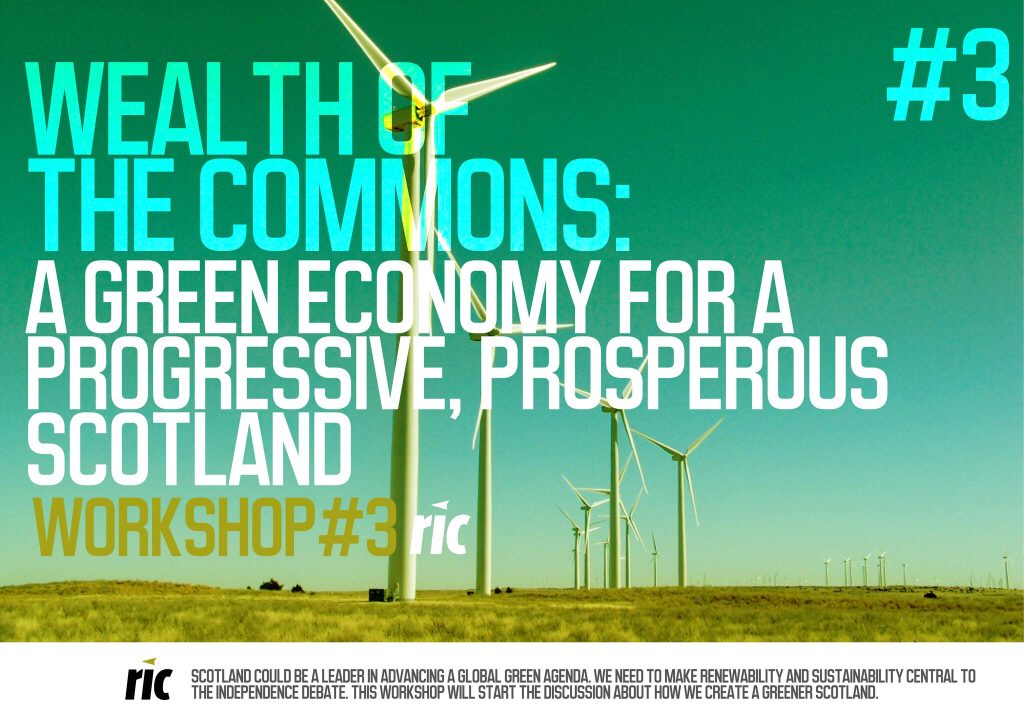Radical Independence Conference: Wealth of the commons
Saturday 24th November saw the Radical Independence Conference being held in Glasgow, bringing together over 800 people from across the Scottish left. Bright Green held a workshop on the economy (the only workshop to focus on economic matters, as George Kerevan pointed out in his article on the conference).
I was asked to sum up the session at the plenary session when, by the end of the day, brains had gone a bit melty. In that context I had considered condensing my summary to one phrase – that it was about devolving power to the people. But I expanded on that a little and here I’ll expand some more.
The session consisted of four speakers in the form of Bright Green editors Peter McColl, Gary Dunion, Maggie Chapman and Alyson Macdonald, followed by open questions from the floor. Of course, in true lefty style the session over ran and the questions were often comments, but on the whole it was a really positive and productive session.
Peter started the discussion with an analysis of the economic context. The economic and environmental crisis, he said, was rooted in corporate power, in the myth of trickledown economics and on a reliance on growth. He said that growth is not an end in itself, as so many of our economic and political leaders seem to think. But rather we must be striving for social and environmental wellbeing instead of chasing growth at the expense of ever dwindling resources.
Peter also touched on intergenerational politics – I think my favourite topic of his – and laid out some of the evidence showing a concerted attack on the young, both by the Westminster government but also by governments in other countries. However he was keen to point out that the answer to this attack on the young – through £9000 fees, removal of benefits and lower wages – was not to take away benefits from older generations. Instead we must protect the principle of universality. Peter’s policy suggestion in that context – and in the context of an independent Scotland – was for a Citizens Income. This is a long standing green policy that guarantees a minimum level of income for every citizen, above which you pay a certain level of tax. You can find out more about Citizens Income here.
Next up was Gary who spoke about an idea that’s creating a buzz in the Green Party of England and Wales. The “right to buy-out” was passed as policy at their recent conference and essentially gives employees the right to buy out the company they work for and take it over as a cooperative. Crucially, the buy-out would be financed by a Green Investment Bank, ensuring that workers at all income levels could afford to exercise some control and agency in their workplace. He gave examples of Spanish workers; coops which have been up and running successfully for decades. There’s more on the “right to buy-out” here.
Maggie spoke about an idea that’s very much already up and running and which fits the idea of devolving power to the people perfectly. Participatory budgeting, where communities deliberate and decide on how budgets are spent, is a way of reinvigorating decision making and ensuring more people have a stake in how public money is spent. The example of £eith Decides, based in Leith in Edinburgh, shows how a pot of money from the city council’s budget can bring benefits to the local community – and not just economically through benefiting local charities and voluntary organisations, but by bringing hundreds of local residents together with a shared interest in their area and the people in it. The resilience and trust that are built in the community and in democratic processes are incredibly valuable and those planning the economics of an independent Scotland would do well to consider replicating such a model across the country. To find out more, see the Participatory Budgeting Unit.
Lastly, Alyson Macdonald spoke about housing and the self-perpetuating self-interest that our current housing set-up creates. The dominant market mechanisms of home ownership and the growing private rented sector force us to be more self interested and to focus our personal and subsequently political interests on the creation and control of unearned asset wealth. She suggested that a large scale shift towards housing cooperatives may be the answer.
Patrick Harvie was asked to chip in on energy. He talked about the need for community owned renewables, creating a sustainable, affordable and democratically locally controlled energy source for communities across Scotland. He argued that such schemes need to be properly financed and that potentially, local government may hold the key, given their existing borrowing powers. However there may be greater opportunities for investment with energy policy completely devolved to Scotland post-2014 and community benefit devolved as soon as possible. You can find out more about community energy here.
A good discussion followed the presentations from the speakers, with contributions from a diverse range of people of varying political backgrounds. George Kerevan piped up to convey his relief at the discussion of economic policy but expressed some concerns about where the Scottish economy will be in 2015 when negotiations start. He also pointed out that workers co-ops may still find themselves operating in markets as they end up competing with each other, and that we haven’t yet cracked the issue of publicly owned banks. A speaker from the SSP pointed out that despite Labour’s relationship with the cooperative movement, a Labour Government at Westminster had missed the opportunity to turn the nationalised Royal Bank of Scotland into a cooperative.
Other speakers questioned whether participatory budgeting could potentially fall victim to individual selfish interests of those getting involved, but Maggie Chapman responded to say that the real risk is a lack of discussion and participation in democracy.
Another couple of speakers urged the panel to focus on more practical immediate actions such as cooperative food banks and more of a caring, nurturing society where loneliness no longer keeps people captive in their homes. There was also a call to ensure that the language that’s used to describe policies like participatory budgeting isn’t too exclusive but rather focuses on narratives and telling the stories of how these policies will make people’s lives better in an independent Scotland.
For more on the conference itself and on what happens next, see http://radicalindependence.org/



Leave a Reply